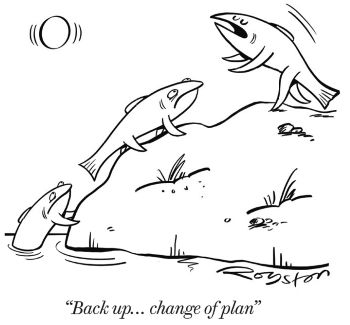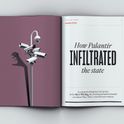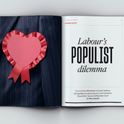Altered states
Feargal Cochrane’s essay (“Unionism, nationalism and unrequited love,” June) correctly diagnoses one of the features of Northern Ireland’s unique and occasionally tragic predicament at the crossroads of two states: its ambivalent relationships with those two “patron” countries—Ireland and Britain.
But what happens when one of those states is fundamentally altering itself, as the UK currently is? Elsewhere in the same issue, Tom Clark asks important questions about the acceptability of monarchy in the 21st century, and Jill Rutter asks whether Whitehall and Westminster are equipped to rebuild trust in governance. Citizens in Northern Ireland are entitled to ask these questions too, as they consider their own jurisdiction’s long-term constitutional future.
Because of our difficult history, and because so much diplomatic effort has gone into managing our alternately inspiring and dispiriting peace process, there can, in both London and Dublin, be a tendency to infantilise people here as singularly tribal. Whatever the quality of our dominant parties, people in Northern Ireland are capable of making more complex assessments based on argument. My own party has launched a New Ireland Commission to test proposals for constitutional change. Whatever the future of these islands, looking one another in the eye and making arguments based on empathy and reason is progress.
Matthew O’Toole, Social Democratic and Labour Party MLA for South Belfast
Changing of the guard
Tom Clark’s article (“Roadmap to a republic,” June) is a salutary response to the grotesque paean of adulation that accompanied Prince Philip to the grave. Alas, the voice of reason seems to be powerless where royalty is concerned. This is particularly so as a result of The Crown which, in a post-truth age, has managed to enhance the monarchy’s glamour.
At present, therefore, the sovereign people remain content to be subjects rather than citizens and to retain a hereditary institution at the heart of our supposed democracy. But that may change if Charles III speaks out—as he hankers to do, according to Jonathan Dimbleby—“on matters of national and international importance in ways that at the moment would be unthinkable.”
One hopes that such excesses would strengthen the demand for an elected head of state. But they should at least remind us of Walter Bagehot’s warning about the danger of having, “upon a constitutional throne, an active and meddling fool.”
Piers Brendon, historian and former keeper of the Churchill Archives
Clark’s fascinating article on a new dawning for republicanism refers to how Edward VIII, the last monarch to voluntarily abdicate, was “snookered” by democratic politics and forced into his decision. Actually, Stanley Baldwin, the then prime minister, went out of his way to attempt to persuade Edward not to abdicate, at one point despairingly asking the king: “Can I take it for certain, sir, that if the Archangel Gabriel came down from Heaven and asked you to change your mind, it would have no effect on you?”
Baldwin was aware that, should the popular king abdicate so that he might marry the unpopular Wallis Simpson, it would cause the public to react violently against Edward himself (as they subsequently did), but also—if the situation was not carefully massaged—against the very institution of the monarchy. Thus the arrival of the untested and terrified George VI on the throne in late 1936 was skilfully spun by sympathetic newspapers as the resumption of stability after a period of turmoil.
One can only wonder whether, after Elizabeth II dies and her son becomes king, the press will be similarly craven, or if they will strike a new and insolent note. Judging by precedent both recent and historic, it seems as if mawkishness and forelock-tugging will out once again.
Alexander Larman, author of “The Crown in Crisis”
Wasted warnings
I would point out to Anne McElvoy (“In praise of lost causes,” June) that Project Fear does not work if deeper cultural concerns are at play.
Constitutional referendums are about more than taxation and spending. The Brexit vote was less about whether a family would be £4,300 worse off by 2030 than community, identity and belonging. It asked whether the United Kingdom should be a member state of a supranational institution, or a nation state in which the elected government has the last say over its laws, borders and taxes.
We are now heading for a long period of constitutional debate over Scottish independence and what will best serve those living on these isles. Some practical things, such as currency, will require an answer. But at the core are questions of what sort of country Scotland wants to be and whether its future lies in the UK or the EU. Fears and uncertainties will play a part, but they won’t be the determining factor.
Gisela Stuart was chair of Vote Leave
Reorientated
Although generous towards me, Sameer Rahim’s review of my biography of Edward Said (“Disorientated,” June) is obsessed with the imagined failings of its subject. False notes betray a prior animus. He declares, for example, that Said was “widely dubbed the professor of terror,” borrowing a phrase infamously devised by Edward Alexander in the virulently Zionist magazine Commentary in 1989. To say Said was “generally” known by this slander is absurd.
Rahim asserts Said’s “confusions,” but it is Rahim who is confused. Apart from factual errors—Said did not work with RP Blackmur at Columbia, as Rahim states, nor did Foucault ever say that texts do not “speak to a ‘real world’”—Said’s alertness to contradiction goes over his head.
He insists on flat either-ors, ignoring Said’s dialectical sensibilities. Rather than “imprisoning culture in political theories,” Said reminded us of the overt politics of much great literature (Swift, Milton, Dante, Darwish). Instead of a tragic inconsistency in which Said returned to the western canonical fold after ill-spent years “trashing” the west, Said steadily maintained that even many imperialistic scholars were great minds from which we can learn.
Timothy Brennan, author of “Places of Mind: A Life of Edward Said”
Rahim makes it very clear that Said was his own worst enemy (although his academic nemesis Bernard Lewis was hardly a dispassionate critic).
Born a Christian Palestinian, Said received a privileged colonial education in Jerusalem and Cairo, only to be transplanted as a teenager to live among the upper-class east coast intelligentsia in the US; no surprise that he was insecure about his identity.
His famous book Orientalism (1978) opened itself to criticism, not only for some of its readings, but also for its focus on literature rather than historical writing. Even so, it is having a new moment in revisionist historiography on the classical world and Byzantium, and its basic lesson is still important. The relation of someone’s politics to their academic writing is a fraught question, but Orientalism and its influence cannot be written off.
Averil Cameron, professor of late antique and Byzantine history
Come fly with me
Julian Glover is right to want to keep flying after the pandemic (“How to fix,” May). The idea that hairshirt solutions that limit mobility are going to solve climate change is nonsense. The ability to travel is one of the great gains of the last century and taking that freedom away, or making it available only to the wealthy, would only serve to turn large numbers of people against the whole climate agenda. A climate lockdown is not the answer.
The answer lies in the development of cleaner ways of powering aircraft. Hydrogen and a new generation of batteries could help in the future, but in the short term the obvious and readily available solution is sustainable aviation fuels, produced mainly from biological material. Such fuels are already in use, blending with traditional jet fuel in a way which improves efficiency and air quality by reducing both emissions and the release of particulates. Their development at scale, to reduce costs, should be a priority for governments, scientists and the aviation sector, as the world moves beyond fears of extinction to find economically viable solutions to the challenge of climate change.
Nick Buter, visiting professor, King’s College London
Humean error
Julian Baggini sheds fresh light on current debates about how to treat canonical thinkers who held racist and sexist views (“The Hume paradox,” June).
Instead of attempting to excise Hume’s offensive positions from the allegedly unobjectionable core of his philosophy, as many of his reactionary defenders are wont to do, Baggini instead demonstrates a tight link between the two, claiming the very same sceptical principles that made Hume a brilliant philosopher lead him astray in matters of politics and social mores.
But while this recognition of the irreducible complexity of Hume’s legacy is surely welcome, mistakes about the fundamental moral worth of whole classes of human beings are arguably quite different from the sorts of mistakes that can be chalked up to the misapplication of philosophical principles. Moreover, insisting the Enlightenment’s best and brightest should be both celebrated and condemned does not obviate the need to calibrate between these two responses, which pull us in irreconcilable directions.
Sasha Mudd, University of Southampton
Baggini is slightly unfair to suggest that Hume spoke with one voice when doing philosophy and another when doing politics.
Isn’t the relevant distinction between politics and metaphysical speculation that the precautionary principle has a necessary place in the first, but little or none in the second? And isn’t it often the application of the precautionary principle that, together with a dash of utilitarianism, should determine whether a particular political decision is right or wrong?
The precautionary principle might make a political decision “conservative” (for instance by urging caution about new gene-editing technologies) or “radical” (for example by insisting we stop the burning of fossil fuels immediately because if there is even a chance they are causing apocalyptic global warming, the risk is too great to take).
I suspect Hume understood all this very well. And if he was a reactionary, I doubt it was for the reasons Baggini gives.
Charles Foster, University of Oxford
Our natural inheritance
James K Galbraith claims that “a strong estate-and-gift tax and a strong land-value tax would complement a full employment policy, promote democracy, efficiency and a green transition” (“How to fix,” April). This is doubtful, especially the green claim, but what is certain is that it would result in stagnation and decay of the land, because it would incentivise exploitation by owners in it for the short-term only.
At present many, if not most, landowners follow their forebears in investing both money and effort in beautifying their estates for future generations, for example by planting ornamental trees. Many today (and not just members of individual families) appreciate the inheritance stored up for us by the foresight and self-sacrifice of previous generations of landowners. Why should anyone invest like that if they themselves will be taxed ever more heavily the more they enhance their land, and be precluded by punitive taxation from passing it on to their children and grandchildren? The nation as a whole would be in many ways the poorer for such a short-sighted policy.
Reverend Peter Irwin-Clark, West Sussex
A word to the weird
Regarding Alex Dean’s portrait of Frank Zappa (“The importance of being absurdist,” June), I accept that he had fun with silly words and was musically incredibly inventive. But the absurdism is something of a limitation.
I think art is supposed to make sense of a meaningless world. Absurdism, in a sense, is a refusal to take the risk of saying something serious about the pain, joy and complexity of life.
Richard Herriott, Aarhus, Denmark
In fact:
In a poll of 2,000 Britons under 30, respondents said that the number one sign that someone is old is “ordering a cappuccino”: 52 per cent said only “ancient” people do that.
Daily Mail, 28th April 2021
Of the 293 Republicans serving in the US Senate or House on Trump’s 2017 inauguration day, 132 (45 per cent) are either out of Congress or have said they’ll step down.
FiveThirtyEight, 27th April 2021
Nine of the top 10 happiest countries in the world are in Europe. Finland is first, New Zealand ninth and the UK has dropped to 18th.
World Happiness Report, 2021
There are up to 6m feral hogs in the US; the damage they cause and the cost of controlling them amounts to at least $1.5bn a year.
The Atlantic, 15th May 2021
Just three leaders of the Labour Party have won majorities at general elections and only one of those was born in the past 100 years.
The Times, 9th May 2021
Beijing now has 100 billionaires, more than any other city (overtaking New York, with 99).
Forbes, 6th April 2021
Out of 1,300 major Hollywood movies from 2007 to 2019, 44 had a lead or co-leading character of Asian or Pacific Islander ethnicity—and nearly a third of those (14) were played by Dwayne “The Rock” Johnson.
Los Angeles Times, 18th May 2021
Henry VIII ordered the first known pair of football boots from his Great Wardrobe in 1526.
Footballboots.co.uk
Between Justin Trudeau’s election in 2015 and 2019, Canada’s greenhouse gas emissions increased by 1 per cent—the only G7 nation to show an increase since the Paris Agreement.
New York Times, 21st April 2021
In physicist Wernher von Braun’s science fiction book Mars Project (1953), the head of the Martian government holds the title “Elon.”
Entrepreneur, 6th May 2021














